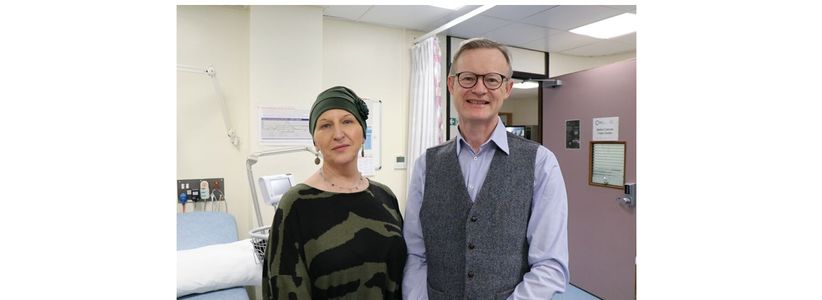Scottish patient first in Europe to get personalised cancer therapy for gastro-oesophageal cancer

19th December 2024
A cancer patient from Dundee has become the first patient in Europe on a global trial to be given a personalised cancer therapy (Individualized Neoantigen Therapy - INT) for their type of cancer, using similar technology to the Covid-19 mRNA vaccine
Jennifer Robertson, 59, from Broughty Ferry, who is undergoing treatment for gastro-oesophageal cancer, received an investigational therapy called mRNA-4157 (V940), which was developed by Moderna and MSD.
This mRNA therapy has only been given to four other people with this cancer type globally so far, through the Phase 1 clinical trial (NCT03313778).
Its components are designed against each patient’s tumour by analysing its biological make-up to discover which potential targets for the immune system are present on the tumour.
Then an individualised mRNA therapy is specifically created to enable the patient’s own immune system to attack and destroy those tumour cells and administered to the patient as an injection.
Tayside Cancer Centre, a University of Dundee and NHS Tayside facility, is one of 38 cancer centres around the world running this trial of the mRNA therapy, which is also being investigated in people with non-small cell lung cancer and pancreatic cancer as well as gastric and gastro-oesophageal cancer.
In total, only 20 patients across the world who have gastro or gastro-oesophageal cancer are planned to be given this therapy during its current phase 1 clinical trial.
Russell Petty, Professor of Medical Oncology at the University of Dundee and Director of Research and Development at NHS Tayside, is leading the clinical trial in Scotland. The trial is also open across the UK in hospitals in London, Manchester and Oxford.
Professor Petty said, “This therapy aims to provide a new approach to engaging the patient’s own immune system to fight their cancer. This trial is establishing critical foundations that bring us closer to developing therapies for solid tumours that are potentially efficacious, less toxic and more precise.
“It is currently being used alongside other cancer treatments in patients who are receiving surgery to remove their tumours, but ultimately if successful the therapy could have much broader use in the future.
“This is a very novel treatment approach which could transform the way we treat cancer, and these trials are the beginning of that journey. Every patient who this works for provides us with more knowledge to improve the way we treat cancer.”
The full release can be read on the University of Dundee website.

